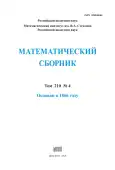卷 210, 编号 4 (2019)
Eigenvalue asymptotics of long Kirchhoff plates with clamped edges
摘要
 3-26
3-26


Groups of line and circle homeomorphisms. Criteria for almost nilpotency
摘要
 27-40
27-40


The foundations of $(2n,k)$-manifolds
摘要
 41-86
41-86


Convergence of spline interpolation processes and conditionality of systems of equations for spline construction
摘要
 87-102
87-102


Linear collective collocation approximation for parametric and stochastic elliptic PDEs
摘要
 103-127
103-127


On simultaneous approximations of $\ln3$ and $\pi/\sqrt3$ by rational numbers
摘要
 128-144
128-144


Equivalence of the trigonometric system and its perturbations in the spaces $L^p$ and $C$
摘要
Let $B=B[-\pi,\pi]$ be any of the spaces $L^p(-\pi,\pi)$, $1\leq p< \infty$, $p\neq2$, and $C[-\pi,\pi]$, and let $B_a=B[-\pi+a,\pi+a]$, $a\in\mathbb R$. A number of necessary conditions and sufficient conditions for the ‘perturbed trigonometric system’ $e^{i(n+\alpha_n)t}$, $n\in\mathbb Z$, to be equivalent to the trigonometric system $e^{int}$, $n\in\mathbb Z$, in the space $B_a$ for any $a\in\mathbb R$ are obtained. In particular, it is shown that if $(\alpha_n)\in l^s$, where $1/s=|1/p-1/2|$, then this equivalence takes place, the exponent $s$ being sharp. This result is used to show that in $L^p(-\pi,\pi)$, $1< p< 2$, there exist bases of exponentials which are not equivalent to the trigonometric basis.
The machinery of Fourier multipliers is used in the proofs.
Bibliography: 18 titles.
 145-164
145-164










